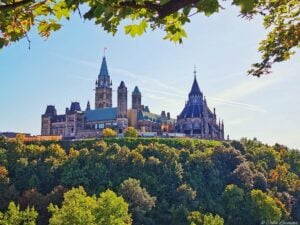What was to be one of British Columbia’s most exciting dive spots, is now potentially on its way to becoming an environmental hazard.
The Artificial Reef Society of British Columbia was going to sink the Annapolis, a 50-year-old destroyer, in Halkett bay near Vancouver, B.C. in January.
But a group of concerned residents, united under the name Save Halkett Bay, say they are concerned about potential toxins in the ship, and filed an injunction in January weeks before the ship was set to sink.
The group’s lawyer, Martin Peters, told The Canadian Press that they have third party evidence that the ship contains toxic compounds called tributyltins, which are designed to inhibit marine growth.
“This is the most dangerous substance, most toxic substance, ever introduced into the marine environment,” Peters said.
But the Artificial Reef Society says the Annapolis needs to be moved and sunk soon. They had already been preparing the ship for sinking, and the society’s lawyer, Bryan Hicks, says the ship is in a precarious position.
“Not only would it be an environmental catastrophe from the perspective of its effects on the sea bed at that location … but also it would create danger for boat traffic in that area,” Hicks told The Canadian Press.
Hicks said the federal government considered tributyltins when it gave the society permission to sink the ship.
The Annapolis was to be the Artificial Reef Society’s most ambitious project yet. (See our Wildlife 2015 issue for more about how the Artificial Reef Society was going to make the Annapolis a diver’s paradise and a safe haven for species at risk.) Commissioned in 1964 and built in Halifax, the Annapolis was one of two steam-powered destroyers designed to carry Sea King helicopters. It served off the East Coast until 1989 and was then transferred to the West Coast, and finally decommissioned in 1996.
Howard Robins, president of the Artificial Reef Society, said in a December interview that the Annapolis was also going to be their cleanest wreck yet.
After the government removes anything potentially toxic, Robins said, the volunteer crew from the Society then spend days preparing the ship by removing machinery, pipes, gaskets and anything else that may have oil or any other pollutant in it so there is no risk.
Jeffrey Marliave, vice president of marine sciences at the Vancouver Aquarium, said in December, that artificial reefs provide important footholds for life on an otherwise barren seafloor.
“A lot of people don’t understand how utterly bleak the sea bottom can be,” he said. And these artificial reefs provide “highly complex habitats” typical in rock piles in natural reefs.
The Annapolis will provide habitat for two species of rockfish, which, Marliave said, are considered by the Committee on the Status of Endangered Wildlife in Canada to be in trouble.
“The judge understands the urgency, but we understand the judicial process can take time,” he says. “We’re hoping to have a decision in a week to 10 days. At which point, if the decision is in our favour, the plan is to go quickly.”
Since 1991, the Artificial Reef Society of British Columbia has gutted, cleaned and sunk a Boeing 737, a Second World War Victory Ship, four destroyer escorts and a coastal freighter in an effort to make ecological hot spots that would attract divers from around the world.




